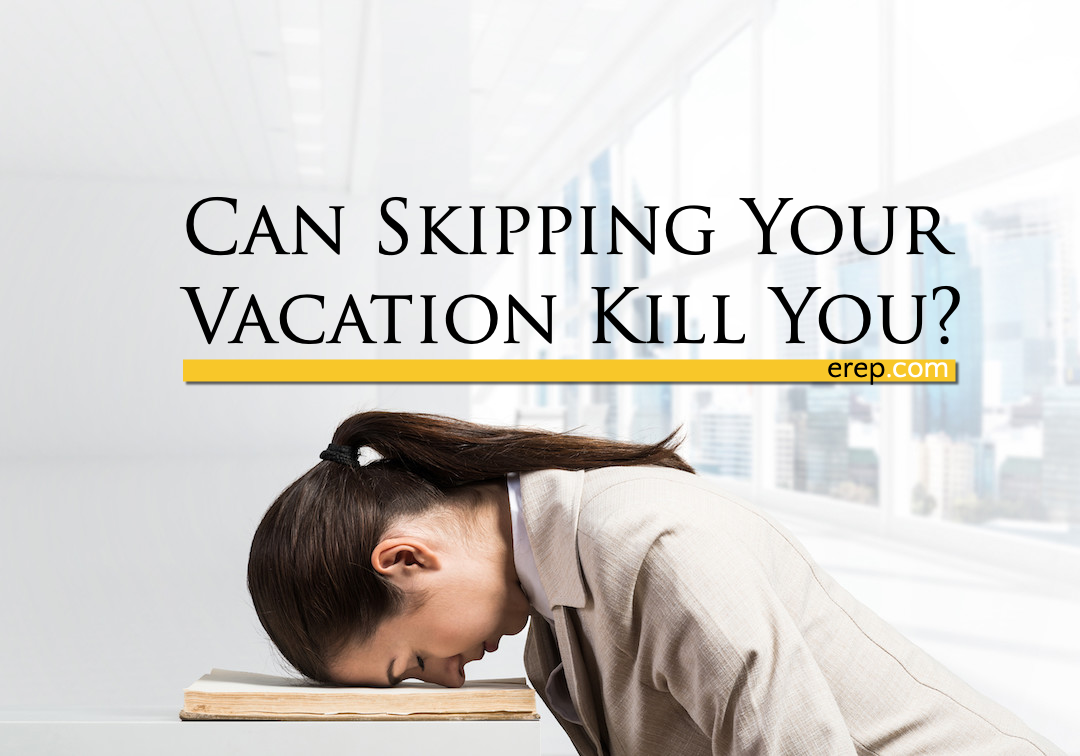Can Skipping Your Vacation Kill You?
- By
- Steve Williamson, VP Digital Marketing and Content, eRep, Inc.
- Posted
- Monday, September 4, 2023

Athletes will tell you that adequate and appropriate recovery is crucial to ensuring their workouts are effective and sustainable. Work hard then rest well for peak performance.
In the world of employment, whether you are a young pup fresh out of school at your first real job or a seasoned executive with a corner penthouse office, the same principle applies. Your brain and your body needs adequate rest and recovery so that your work effort is at peak performance.
Inadequate recovery and time away from the office or job site can do more harm than just reducing productivity. It can actually kill you.
Too Much Work Makes Jack a Dead Boy
A study by the World Health Organization (WHO), quoted by Forbes, found that 745,000 people died in 2016 from heart disease and stroke due to long hours.1
Furthermore, the research also found that "...Working 55 hours or more a week was associated with a 35% higher risk of stroke and a 17% higher risk of dying from heart disease than a workweek of 35 to 40 hours."
There are several factors at play, especially in the United States. We have a level of social pressure to work hard almost unmatched in the industrialized world. The attitude is so pervasive people will humble-brag on social media about how many hours they're working, as if it's a badge of honor.
We exalt those who are essentially — and literally — killing themselves by pulling long hours every week at the office.
It has been reported that it takes at least 4 days of time away from the office before your brain really lets go of your work duties and true recovery can begin. Data shows that too many people fail to take adequate breaks of this length or more from their job, however.
Harvard Business Review reported, "An Ernst & Young study showed that for every additional 10 hours of vacation time that employees took, their year-end performance improved 8%, and another study showed that using all of your vacation time increases your chances of getting a promotion or a raise."2
Many workers at the bottom end of the pay scale don't — or can't — take time off of work. The worker shortage during the pandemic didn't help, and we read articles on an almost daily basis about employers who treat their staff like ungrateful resources rather than human beings.
"No one wants to work anymore!" these employers lament. No, they just don't want to work where they're not appreciated for the value they provide.
Even on a micro scale, the benefits of time off can be instantly measurable. Studies and real-world experiments by employers around the globe have shown that employees who work four 8-hour days per week (32 hours total) often get more done in actual productivity than their peers who work five 8-hour days.
It seems that productivity may be more about quality, focused effort than it is about quantity.
Stress
Whether it's at work or in your home life, stress can be both a good thing and a bad thing. This dichotomy depends on two factors: how bad is your stress — based on intensity and duration — and do you have the ability and mechanisms to handle it effectively.
Stress can be healthy when it challenges us to grow out of our routine and we have the mechanisms in place to tackle it and then recover from it. Lifting weights at the gym is a classic example. We push our body a little beyond what it's used to, tiny muscle fibers are momentarily weakened, and during our recovery period those muscle fibers are repaired and are incrementally stronger because of it.
If you lifted heavy weights every day without rest, or weights significantly beyond your current abilities, your muscles would never recover and never grow.
Work stress is the same way. When we are challenged to learn something new or tackle a task that is slightly out of our comfort zone (yet still within our abilities and available resources), we use mental and social muscles in a way that makes them grow to adapt to the new demands. But that growth requires recovery, and if these demands are too far beyond our current ability or continue for too long, our minds and even our bodies suffer.
Whether it is physical, mental or emotional stress that we face, we must have the time and space to adequately recover so that when we return to work, we are fit and ready to tackle the tasks of the day with renewed energy and motivation.
This cycle of effort and recovery, in proper balance and at an appropriate cadence, is where true productivity and growth occurs.
NOTES
[2] https://hbr.org/2023/07/how-taking-a-vacation-improves-your-well-being
Go to eRep.com/core-values-index/ to learn more about the CVI or to take the Core Values Index assessment.

Steve Williamson
Innovator/Banker - VP Digital Marketing and Content, eRep, Inc.
Steve has a career in project management, software development and technical team leadership spanning three decades. He is the author of a series of fantasy novels called The Taesian Chronicles (ruckerworks.com), and when he isn't writing, he enjoys cycling, old-school table-top role-playing games, and buzzing around the virtual skies in his home-built flight simulator.
View additional articles by this contributor
Share This Article
Essentials
Additional Reading
Stay Updated
Employer Account Sign-up
Sign up for an employer account and get these features and functions right away:
- Unlimited Job Listings on eRep.com
- Applicant Search
- Applicant Tracking System (ATS)
- Unlimited Happiness Index employee surveys
- 3 full/comprehensive CVIs™
- No credit card required — no long-term commitment — cancel at any time
Write for eRep
Are you interested in writing for eRep? Read our submission guidelines.
